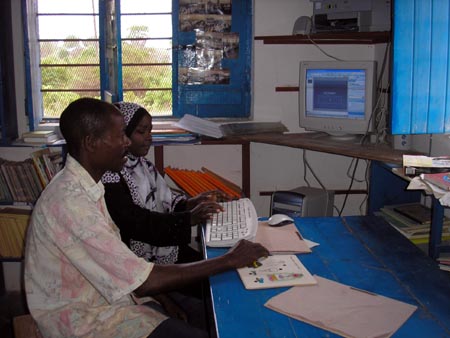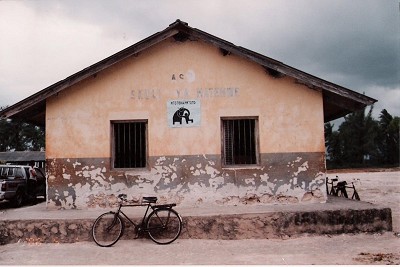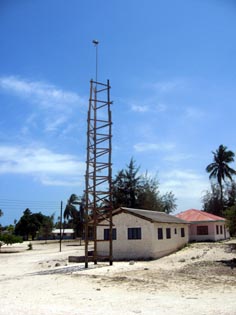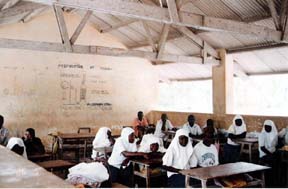OLPCorps Jamii OLPC Tanzania: Difference between revisions
| Line 96: | Line 96: | ||
==OLPCorps Proposal== |
==OLPCorps Proposal== |
||
<center>'''''This is a work in progress!<br>It will be updated substantially following the Matemwe School Computer Centre Annual General Meeting |
<center>'''''This is a work in progress!<br>It will be updated substantially following the Matemwe School Computer Centre Annual General Meeting<br>on Monday, March 23, 2009''''' </center> |
||
[http://www.jamiiolpc.wordpress.com Jamii OLPC] is an experienced multi-national, multi-university team partnered with [http://wiki.laptop.org/go/OLPCorps_Jamii_OLPC_Tanzania#Matemwe_School Matemwe School] and the associated Matemwe School Computer Centre (MSCC) NGO, in Zanzibar, Tanzania. The Jamii OLPC team is made up of four units: |
[http://www.jamiiolpc.wordpress.com Jamii OLPC] is an experienced multi-national, multi-university team partnered with [http://wiki.laptop.org/go/OLPCorps_Jamii_OLPC_Tanzania#Matemwe_School Matemwe School] and the associated Matemwe School Computer Centre (MSCC) NGO, in Zanzibar, Tanzania. The Jamii OLPC team is made up of four units: |
||
Revision as of 14:19, 22 March 2009
Jamii OLPC
“Jamii” means "community" in Swahili, and is the foundational principle of Jamii OLPC's OLPCorps Africa proposal:
Real, sustainable development comes from the people who make cities, towns and villages communities.
A partnership between Matemwe School, and the Matemwe School Computer Centre NGO of Zanzibar, Tanzania and numerous international team members, Jamii OLPC is a small but experienced multi-national, multi-university team applying to the One Laptop per Child 2009 OLPCorps Africa program.
Jamii OLPC hopes to be accepted into the OLPCorps Africa program and provided with 100 XO laptops to begin an XO Library at Matemwe.
Children are the future; if equipped with education, tools and opportunities, this generation can take up the battle to improve the lives of their families, community and country--and win.
This generation can make a difference.
Visit our website
You can also email us at JamiiOLPC@gmail.com.
News!
posted: March 19, 2009
Meet an Aspiring OLPCorps Applicant in Ottawa-Gatineau
This Saturday, Samantha Burton, a MA Mass Communication student at Carleton College and Project Coordinator of Jamii OLPC will be at the Ottawa XO Users Group meeting to talk about their OLPCorps application.
Ottawa XO Users Group Meeting
When: Saturday March 21, 2009 - 13:00-15:00 h.
Where: Carleton Campus; The Herzberg Physics Bldg (HP) Room: HP4351
Read the latest Jamii OLPC news on our blog!
Matemwe School
Matemwe is a fishing village, located on the north east coast of Zanzibar, Tanzania.
At Matemwe School, facilities are minimal and there is forever a shortage of school supplies, but the desire for education burns in the hearts of all.
Visit Matemwe School’s official website here.
Project Panga Magae
In January 2006, Matemwe School began a journey toward a dream.
This dream grew from a seedling planted in October 2004, when a privately donated Compaq computer was installed in the Matemwe School library. As teachers received computer training over the course of a year, the Matemwe community began to rally around the idea of teaching their children to become computer literate. Valuable technical skills would open many doors for the next generation; something had to be done.
So, in January 2006, Project Panga Magae was officially started.
Yet, despite all of the efforts of the school and community, 10 computers in a school of over 900 students is no more than a raindrop in the ocean.
Only 15 students are currently able to participate in a computer class. Also, due to the high utility costs (ie. electricity and internet connection) the computers must primarily be used to run an Internet Cafe for tourists.
This provides just enough income to support the computers’ upkeep, but limits the access that Matemwe students and community members have to the lab.
An XO Library for Matemwe School
The idea of an XO Library was introduced to the Jamii OLPC team by the MSCC, and subsequently approved by Paul Commons of OLPCorps as an acceptable deployment strategy.
The XO Library is the most feasible option for optimizing student saturation with limited hardware, as it will provide all 500+ primary school students with access to the 100 XOs. The XO Library will primarily serve the youngest generation at Matemwe School.
Standards 1-6 (7-12 yrs) will rotate in-class computer use throughout the week, and the XO laptops will be available for these children to sign-out and take home each day, providing equal opportunity for each child to take a laptop home at least once a week.
The Matemwe School Computer Centre will organize the daily operations of the XO Library, as well as provide internet access and charging stations for the laptops. On weekends, the MSCC will offer peer-facilitated computer-based training programs and educational activities for children, teachers and community members. Emphasis will be placed on facilitating the development of youth-driven social projects, helping children become agents of change in their community.

Matemwe teachers receiving computer training
OLPCorps Proposal
It will be updated substantially following the Matemwe School Computer Centre Annual General Meeting
on Monday, March 23, 2009
Jamii OLPC is an experienced multi-national, multi-university team partnered with Matemwe School and the associated Matemwe School Computer Centre (MSCC) NGO, in Zanzibar, Tanzania. The Jamii OLPC team is made up of four units:
- the International Unit
- the Matemwe Unit
- the Pedagogical Advisory Unit
- the Information Communication Technologies for International Development (ICT4D) Advisory Unit
The Jamii OLPC team provides a strong foundation for a sustainable, successful project. Our International Unit fieldwork members have been selected for their strong socio-cultural, technical and pedagogical backgrounds, which will facilitate close collaboration and two-way capacity building with the Matemwe Unit during the deployment.
The cornerstone of the project is Matemwe School, a Zanzibar government primary and high school with over 900 students and approximately 500 between the ages of 7 and 12.
Since January 2006, Matemwe School officials, teachers, community leaders and international supporters have been focusing on “bridging the digital divide” through Project Pagna Magae and the MSCC. Over the past three years, Project Pagna Magae has made significant progress.
There are 10 computers in the Matemwe School Computer Centre; however, only 15 high school students are able to participate in computer classes and, because of high utility costs, the computers must primarily be used to run an Internet Cafe for tourists.
Jamii OLPC, Matemwe School and the MSCC are applying to OLPCorps to begin an XO Library in the Matemwe School Computer Centre. The idea of an XO Library was introduced by the MSCC, and subsequently approved by Paul Commons of OLPCorps as an acceptable deployment strategy.
The XO Library is the most feasible option for optimizing student saturation with limited hardware, as it will provide all 500+ primary school students with access to the 100 XOs. The XO Library will primarily serve the youngest generation at Matemwe School. Standards 1-6 (7-12 yrs) will rotate in-class computer use throughout the week. The XO laptops will be available for these children to sign-out and take home each day, providing equal opportunity for each child to take a laptop home at least once a week.
Prior to the deployment, Jamii OLPC’s Pedagogical Advisory Unit will work with the International and Matemwe Pedagogical Leads to develop an Educator’s Package. Emphasis will be placed on developing flexible activities complementing the core subjects least impacted by language or cultural challenges (such as math and science) and a variety of introductory projects (such as the Ninakaa Hapa project).
During and after the deployment, the materials in this Educator’s Package will be adapted and utilized by the Matemwe Pedagogical Leads, other Matemwe School teachers, members of the MSCC and--most importantly--students themselves in the ongoing development of XO and technology-based educational strategies.
The MSCC will organize the daily operations of the XO Library, as well as provide internet access and charging stations for the laptops. On weekends, the MSCC will offer peer-facilitated computer-based training programs and educational activities for children, teachers and community members. Emphasis will be placed on facilitating the development of youth-driven social projects, helping children become agents of change in their community.
Swahili is the main language used in Matemwe School. There are eight English teachers and students start studying English in Standard 2 (8 yrs). Project Coordinator Sam Burton also speaks conversational Swahili. She and Pedagogical Advisory Unit member Jackie Strecker will provide the other International Unit fieldwork members with Swahili language basics, prior to deployment. Zanzibar’s school year runs through the summer, until Ramadan begins on August 22, 2009; the deployment will be scheduled accordingly.
Jamii OLPC is requesting the $10,000 stipend from OLPCorps, which will cover 70% of travel expenses. A detailed preliminary budget is available here. We will be raising funds to cover the remaining costs and pursuing sources of sustainable funding for Matemwe School, including a partnership between Matemwe and an Ottawa-area primary school. Look here for detailed information on Jamii OLPC’s endeavors to secure financial support for Matemwe.
With the existing establishment of Project Panga Magae and the MSCC, as well as the Matemwe community’s demonstration of a continuing commitment to technologies for education, Matemwe School has the foundations for optimal stability following the Jamii OLPC deployment.
The Matemwe community has worked hard to realize the dream of equipping their children with the education, tools and opportunities to improve the lives of their families, community and country. Through OLPCorps, Jamii OLPC can help this dream flourish and grow further—to move from a progressive and innovative idea, to a tangible opportunity for change.
Jamii OLPC Team
The Jamii OLPC team is made up of four units:
- the International Unit
- the Local Unit
- the Pedagogical Advisory Unit
- the Information Communication Technologies for International Development (ICT4D) Advisory Unit
Cooperation and collaboration between the four units is of paramount importance to the success and sustainability of the project. Because of this, the members of all units will be featured here.
International Unit
These individuals are the core Jamii OLPC team, organizing all major aspects of preparation and deployment. They are also responsible for direct communication with OLPCorps.
Only Sam Burton, Daniel Drake and Gracia Jalea will be participating in the fieldwork aspect of the deployment.
Click on the position title for a full description, and on a team member's name for a full bio.
| Position (F=fieldwork) | Name | Country | University | Major | |
|---|---|---|---|---|---|
| Project Coordinator & Political Lead (F) | Samantha Burton | Canada | Carleton University | MA Mass Communications (current) | Samantha.V.Burton@gmail.com
|
| Technical Lead (F) | Daniel Drake | United Kingdom | University of Manchester | BA Computer Science (graduate) | dsd@laptop.org
|
| Pedagogical Lead (F) | Gracia Jalea | Canada | Concordia University | MA Media Studies (current) | gracia.jalea@gmail.com |
| Logistical & Financial Lead | Laura Tribe | Canada | Carleton University | MA Mass Communications | Tribe.laura@gmail.com |
Matemwe Unit
These individuals are the backbone of this projects success and sustainability. They are providing invaluable ongoing insight throughout the planning process, and will be key leaders during and following the deployment.
The remainder of this information will be provided following a March 23, 2009 meeting at Matemwe School.
| Jamii OLPC Position | Name | Country | Matemwe School connection |
|---|---|---|---|
| Technical Lead | Tanzania | ||
| Technical Lead | Tanzania |
| |
| Pedagogical Lead | Tanzania | ||
| Pedagogical Lead | Tanzania | ||
| International Communications | Frederica Boswell | Matemwe School Secretary; BBC Africa; Matemwe resident
| |
| Project Panga Magae Adviser | Tim Boswell | Project Panga Magae Board of Directors Member |
Pedagogical Advisory Unit
These individuals have extensive experience in all educational aspects of OLPC and the XO laptop, such as early childhood education, building applications in Sugar, pedagogy of technology.
Prior to the deployment, this unit will work with the International and Matemwe Pedagogical Leads to develop an Educator’s Package of flexible curricula and introductory projects.
Emphasis will be placed on developing activities complementing the core subjects least impacted by language or cultural challenges (such as math and science), as well as technological introductory activities (such as internet usage and the Ninakaa Hapa project).
During and after the deployment, the materials in this Educator’s Package will be adapted and utilized by the Matemwe Pedagogical Leads, other Matemwe School teachers, members of the MSCC and--most importantly--students themselves in the ongoing development of XO and technology-based educational strategies.
Peek in on the Educator's Package development process at the Jamii OLPC Curriculum Talk wiki page.
| Name | Country | Occupation | |
|---|---|---|---|
| Danny Bakan, B.A., M.A. | Canada | Instructor, Ryerson University, School of Early Childhood Education | adviser on early childhood education curriculum development; SongChild Project Leader |
| Dave Fingrut, B.A. | Canada | MSci Elementary Education, Medaille College, Buffalo, NY | adviser on technology in education, with a focus on free and open source software; Ontario and New York State pedagogical requirements from grades 1-6; practical experience with XO use in early childhood education and video game design in programs Scratch and Gamemaker. |
| Gracia Jalea | Canada | MA Media Studies, Concordia University | Jamii OLPC Pedagogical Lead |
| Dr. Jason Nolan | Canada | Assistant Professor, Ryerson University, School of Early Childhood Education | adviser on curriculum and pedagogy of technology; SongChild Project Leader; research: social technologies for young children, identity construction online, technology and play |
| Dr. Brett Stevens | Canada | Associate Professor, School of Mathematics & Statistics, Carleton University | adviser on XO hardware and software; constructing Sugar applications |
| Jackie Strecker | Canada | MA Communications and Cultures, York University & Ryerson University | adviser on ICTs in international development; peer-to-peer education; Tanzanian culture and Kswahili |
| Ottawa XO Users Group | Canada | advisers on XO hardware and software |
ICT4D Advisory Unit
These individuals and groups have a wide range of expertise and experience related to the OLPCorps project. They have generously offered their time to advise Jamii OLPC on a variety of aspects involved with our proposal.
| Name | Country | Occupation | |
|---|---|---|---|
| Dr. Josh Greenberg | Canada | Assistant Professor, Carleton University, Communication Studies; Director of the Centre for Voluntary Sector Research and Development. | Sam's MA thesis supervisor and NGO liaison advisor; research: media and communication activities in broader strategic planning on the part of NGOs, non-profits and social movement/activist organizations |
| Dr. Daniel Paré | Canada | Associate Professor, Ottawa University, Department of Communication | research: ICTs for international development, internet governance and regulation, Political economy of ICTs, science & technology policy |
| Dr. Sandra Smeltzer | Canada | Assistant Professor, University of Western Ontario, Faculty of Information & Media Studies | Centre for Independent Journalism, Malaysia; Western Heads East Advisor, Mwanza, Tanzania; research: ICTs for international development, global political economy of ICTs |
Project Idea Highlights
Curriculum in Progress
View our Pedagogical Advisory Unit's discussions about curriculum and project development on the Jamii OLPC Curriculum Talk Page.
Formalized ideas will be posted below as they are finalized by the team!
SongChild
Two of the members of our Pedagogical Advisory Unit, Jason Nolan and Danny Bakan, are the Project Leaders of SongChild.
The concept of SongChild is "to develop and maintain an on-line community of users, who will work together to write and share kids songs. The mandate of the site is to foster an Open License Music Project, in which users will work together to build upon and create public domain material. This musical repertoire of public domain kid's songs will be available to share and with children everywhere."
As curriculum and projects are developed, the Pedagogical Advisory Unit will create a way in which to incorporate the SongChild project into Jamii OLPC.
Fundraising
As fundraising efforts are initiated, they will be documented in detail here!


